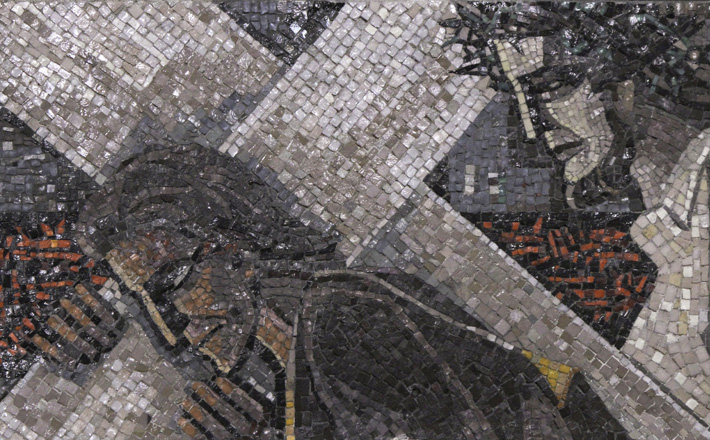Commentary on Matthew 10:24-39
Fear. Is there any more pervasive or powerful motivating force in human experience?
From the moment we are born, we learn to fear the world around us, certainly to fear the stranger, sometimes to fear even those who are closest to us. Political leaders have long recognized the power of fear in ensuring our conformity to the structures this world, even when doing so does not serve our best interests. Fear is the driving force behind vast segments of our economy, as well as, increasingly, our political priorities.
Jesus recognizes that fear will also cause the failure of discipleship. Jesus’ disciples courageously leave the security of their homes and families to follow him as they proclaim the advent of God’s reign, but they, too, will know and ultimately bow before the power of fear. Faithful proclamation and practice of the gospel inevitably puts disciples on a collision course with the powers of this world. So, as Jesus prepares his disciples for their mission to the “lost sheep of the house of Israel,” he is starkly realistic about the threats they will face, at the same time he builds the case for why they should not let this fear master them or hinder their witness.
Jesus’ mission discourse is a “get-out-the-volunteers” campaign like no other. On the one hand, the disciples are granted remarkable powers to heal, exorcise demons, cleanse lepers, even to raise the dead. But he also denies them money, pay, extra clothes, a staff for protection, even sandals. They are to undertake their mission in complete vulnerability and dependence on God (10:8-11), even knowing that they go as “sheep in the midst of wolves,” face arrests and beatings, opposition even from family members, and hatred and persecution (10:16-23).
Why does Jesus highlight the horrors that await the disciples? Naming aloud the suffering to be endured and its causes is the first step in freeing them from the tenacious grip of fear. In the latter half of the discourse, where our focus lies, Jesus continues to describe worst case scenarios, wound together with statements of reassurance and repeated calls to resist fear. The most important element of reassurance lies in the integral relationship that is affirmed between the disciples and Jesus, and through him, God.
“Do not fear” is the dominant, recurrent message in 10:24-31 (cf. 10:26, 28, 31). But first Jesus offers a warning: whatever fate awaits teachers or masters also awaits their disciples and slaves (10:24-25). If Israel’s elites call Jesus “the prince of demons” (cf. 9:34, 12:24), the disciples should be ready for a similar response. “So have no fear of them” (10:26).
The claim that whatever is covered up will be uncovered and secrets made known arises from the disclosive power of the gospel, in which the disciples participate through the means of their mission. Their simplicity, vulnerability, and dependence on God demonstrate the reality of God’s presence and character in the face the world’s claims to possess real power. Even though doing so will bring suffering, the gospel must now be proclaimed “in the light and from the housetops” (10:27), for the gospel proclaimed and lived is the most powerful tool at the disciples’ disposal against the powers of this world.
The threat of death may be the most powerful form of fear. Jesus’ next expression of reassurance addresses this fear directly, yet with irony (10:28-31). The right to kill is one of the chief props in the façade of human political power. Jesus admits that humans exercise this power, but notes that they have power only to kill the body, not the whole person. God alone can destroy both soul and body (10:28); God alone, therefore, is the one we should fear.
This claim represents God’s power as surpassing, but similar in kind to that of human rulers. Jesus then reassures the disciples that God is not, in fact, like the powers. God knows and cares even for the sparrows that are sold “two for a penny.” God knows even the hairs on our heads better than we do (10:29-31, cf. 6:25-33). The threat of violence and death are real concerns for the disciples, but no longer the determining force in their lives, for the one who has ultimate power over our whole being exercises that power with mercy and love.
The sayings in 10:32-39 again encourage disciples to remain firm in their commitment to Jesus and their mission, even when that mission generates inevitable conflicts, even within their families. The saying in 10:34 is crucial: although Jesus has called his disciples to be peacemakers (5:9), his mission does not bring peace, but a sword, so long as the powers resist God’s rule and will. The very act of peacemaking, as Jesus’ ministry demonstrates, generates violence, for healing, restoration, and the conquest of death threaten the foundations of all human assertions of power in defiance of God.
Finally, the call to discipleship renders secondary all other claims upon one’s identity and allegiance, even to father or mother, or son or daughter (10:37, cf. 8:21-22, 12:46-50). To “take up the cross” (10:38-39) aligns the disciples’ mission and fate with that of Jesus, that is, with the humiliation, suffering, shame, opposition, and death that Jesus persistently speaks about here.
Taking up the cross implies identification with the marginal people (slaves and rebels) who were subject to Roman crucifixion, because they did not align themselves with or submit themselves to Rome’s authority. But Jesus promises that those who “lose their life” for him will in fact “find it,” while those who “find their lives” in the world will lose them (10:39).
The answers to fear, then, include clear-eyed recognition of the façades of human power, even those rooted in the threat of death, awareness of the conflict and division the gospel inevitably produces, and especially the deep awareness and conviction that God is present in the world, in mercy and compassion.


June 22, 2014